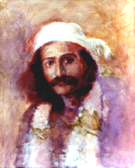Although Lord Meher was written and edited after Meher Baba dropped his body, its genesis began three months before in October 1968. Keshav Nigam, a Baba lover from Hamirpur, was staying at Meherazad for a meeting Baba had convened. "Baba's biography in Hindi is essential," Keshav observed one afternoon to Bhauji. "People are anxious to read it in Hindi."
Bhau did not pay much attention, but Baba himself broached the topic when he persisted later that day in asking Bhau what Keshav had said.
"Keshav said that your biography should be written in Hindi," Bhau informed him.
Baba concurred. "Yes, he is right. It should be there."
Bhau kept quiet. He knew if he agreed, Baba would ask him to write the biography. Baba, too, did not say anything further. A few weeks later, however, Baba asked Bhau to bring a copy of the Ramayana, the famous epic poem of Ram's life by Tulsidas. Baba opened the book at random and instructed Bhau to read a few couplets aloud. After Bhau had read from various parts of the book, Baba declared, "You will write better than this!"
But it was not until 24 January 1969, seven days prior to Beloved Baba dropping his body, that he gave Bhauji explicit instructions to write his biography. In Bhau's introduction, he writes touchingly about the scene in Baba's bedroom that night. Baba was in a critical condition. Amidst his frequent spasms and "jerks," as Bhau describes them, Baba managed to convey:
"Listen carefully to what I say. I am giving you very important work. I want you to write my biography in verse."
Bhau tried to stop Baba, as the strain of gesturing was causing more spasms, but Baba continued to give instructions. Baba also told him: "Include the lives of the five Perfect Masters and my father's life at the beginning."
Bhau listened quietly and did not interrupt. This was to be the last order that Meher Baba ever imparted to him.
Bhauji completed the manuscript for Lord Meher in January 1973, and he began translating it into English with Feram Workingboxwala, who also typed it. The manuscript was given to me for editing soon after I moved to India in June 1975.
Since that time, many others who came in contact with Meher Baba in the West have contributed accounts of their meetings and times spent with him. They include the following: Clarice Adams, Louis Agostini, Herman Alvarado, Agnes Baron, Irene Billo, Cynthia Borg, Bernard Bruford, Marvin & Jean Campen, Rick Chapman, Margaret Craske, Kitty Davy, Harry Dedolchow, Delia DeLeon, Robert Dreyfuss, Ned Foote, Filis Frederick, Colonel Goldney, Max & Gisela Haefliger, Oswald Hall, Jane Haynes, John Haynes, Mik Hamilton, Tom & Dorothy Hopkinson, Henry Kashouty, Ena Lemmon, Bill Le Page, Edward & Irwin Luck, Fred Marks, Jim McGrew, Lyn & Phyllis Ott, Elizabeth Patterson, Tom Riley, Peter Rowan, Darwin & Jeanne Shaw, Don Stevens, Minta Toledano, Kim Tolhurst, Ursula (Uschi) Reinhart, Anita Vieillard, Adele Wolkin and Alan Youell.
Many Indian Baba lovers, also, contributed their accounts. Prominent among them were: Hoshang Bharucha, Keki Desai and Cowas Vesuna.
Others, including Keith Gunn and Duncan Knowles, did much proofreading and made many corrections to the first printing. New information, in the form of diaries, letters and unpublished personal accounts (especially those of Baba's childhood friend, Baily [translated by Feram Workingboxwala and Cyrus Khambatta assisted by Eruch Bohariwala and Kishore Mistry]) came to light during this period — and all pertinent information has been included where appropriate. Thus the English version of Lord Meher expanded considerably.
Editing Lord Meher has been a task of great privilege and constant joy. There is no other book about Meher Baba (nor is there likely to be one anytime soon) that so thoroughly and accurately chronicles Meher Baba's incredibly active life and work from beginning to end.
While working on Lord Meher, I was struck by the "biblical" nature of the narrative. One is swept up by the sweet stories, alluring tales and fascinating personal accounts of meeting the Ancient One, much of it written in an easily read, conversational form. The personification of this Avataric age as a witness named "Age," who frequently comments on the events described, lends a poetic touch to the narrative. Bhau has truly fulfilled his Beloved's command by making the account of Meher Baba's life on earth both "interesting" and "instructive." In addition, he has included a wealth of unpublished discourses given spontaneously by Baba, which take on added meaning when read in the context in which they were given. Through learning more about our Beloved's life — and especially about his way of working with his mandali — we are inevitably brought closer to him.
One night in the late 1960s, Baba told Bhau: "Even if people criticize or find fault with your writing, you should not mind. Just write for me, because I have asked you. This much remember, I tell you honestly, I like your writing. Even if the whole world goes against you, don't care. Let them say whatever they wish. I have asked you to write, so you should do so. When I am pleased with what you write, what more could you want?"
What a blessing and what fortune to be involved with a project that has Meher Baba's divine sanction! Baba's guiding hand was felt by the author from the book's inception. This was the true source of Bhau's inspiration. The power and strength of what Bhau has written has its origin here.
Lord Meher is a book destined to become a classic in the sense that readers will return to it time and again. The profusion of detail contained in it renders a single reading insufficient. It is a book that will continue to be read over and over again, as, without a doubt, it contains the greatest story ever told.
David Fenster
Ahmednagar, 1985





